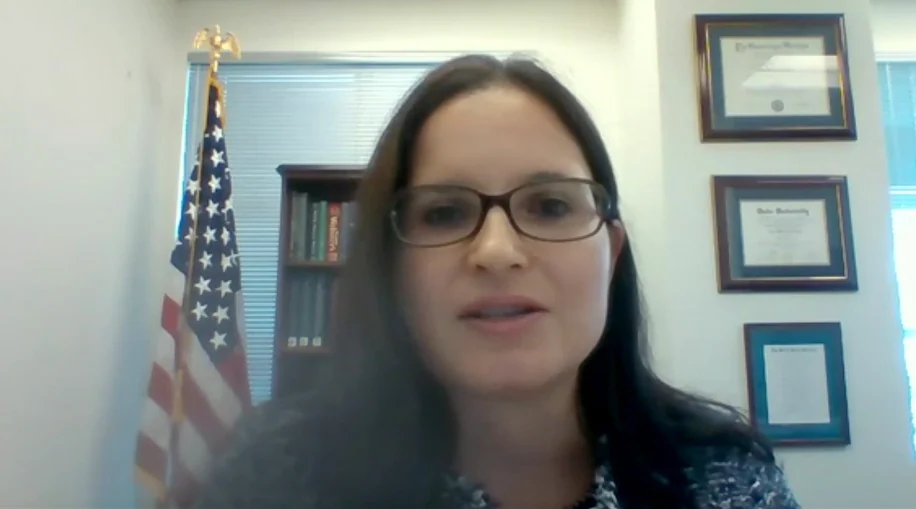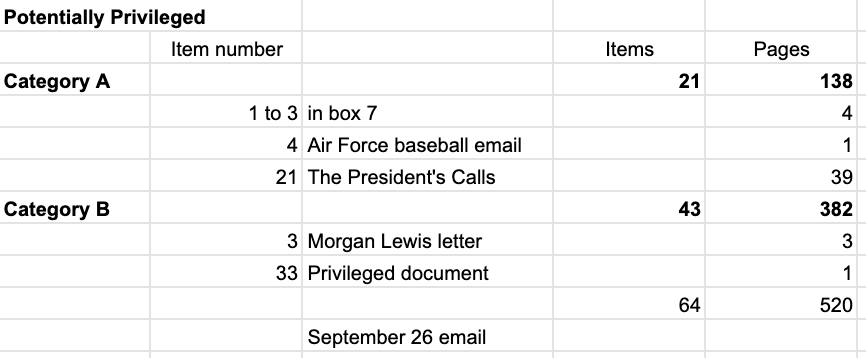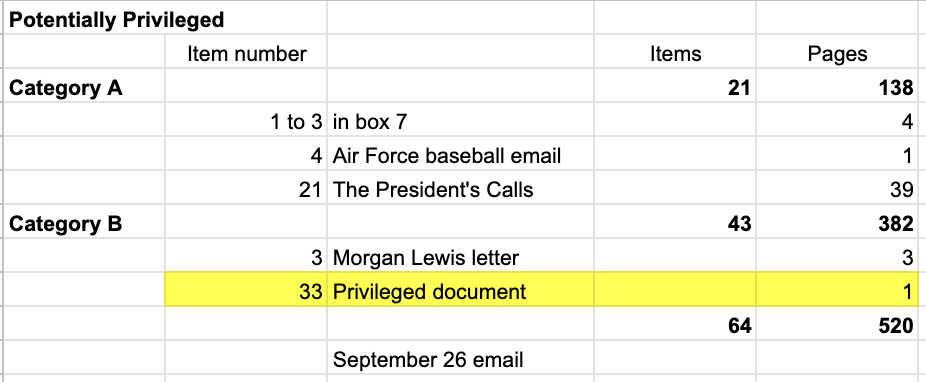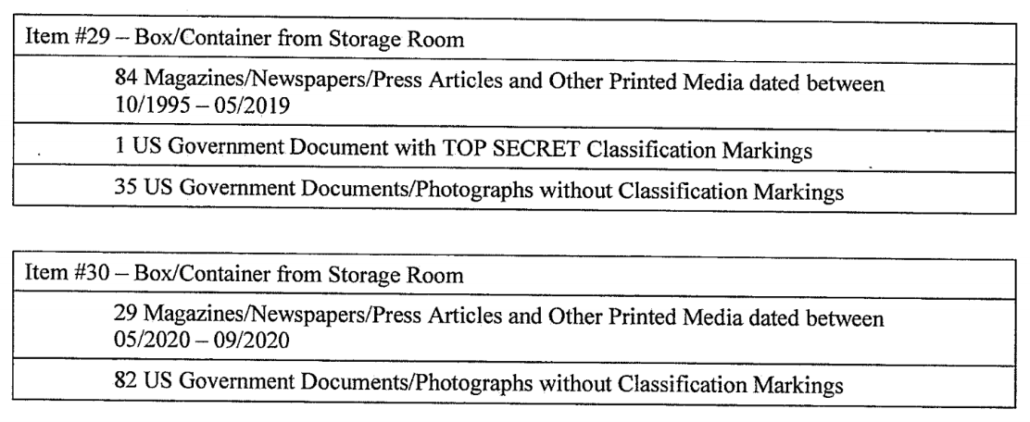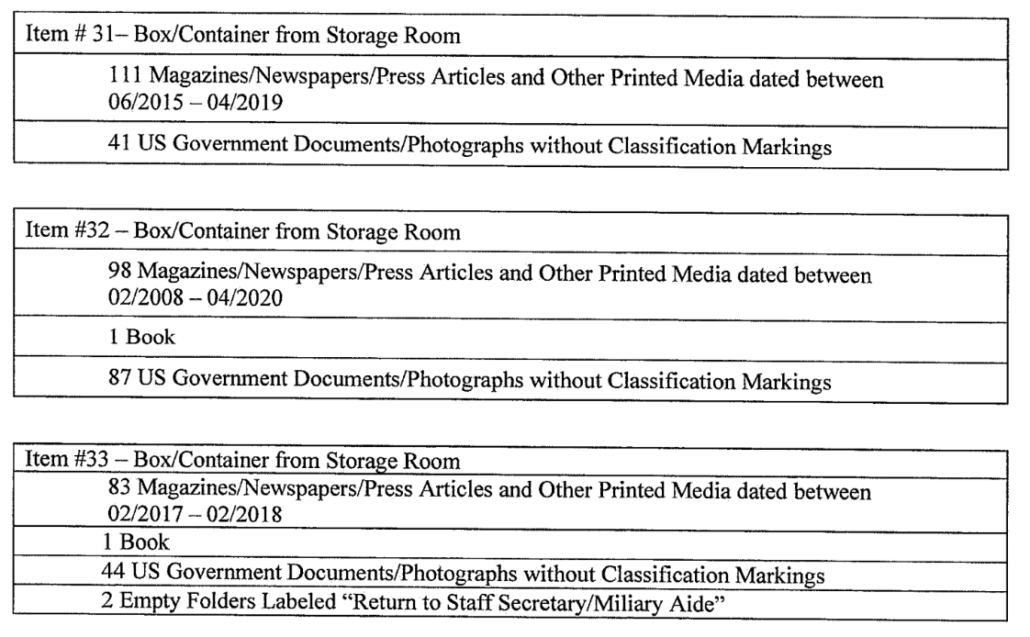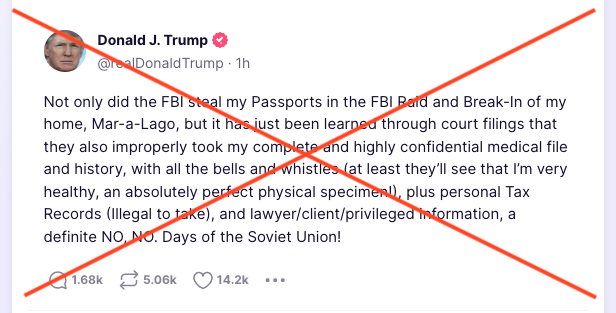Aileen Cannon Deliberately Harmed Trump To Create an Excuse to Help Him
On September 5, Judge Aileen Cannon ruled that depriving Donald Trump of personal items constituted “real harm.”
being deprived of potentially significant personal documents [] creates a real harm
Yesterday, the newly unsealed filter team status report revealed that, for two weeks, Judge Cannon deliberately inflicted that harm on Trump.
That’s because on August 30, DOJ’s filter team told her that they wanted to return the original copies of documents designated as Category B — 43 sets of documents amounting to 382 pages of documents — to Trump.
[T]he PrivilegeReview Team proposes to return the originals and provide a Bates-stamped control copy to the Plaintiff. Many of these materials do not appear to be privileged (although one appears to be.11), but they are all either legal in nature (e.g.,settlement, non-disclosure, and retainer agreements) or otherwise potentially sensitive, and they do not appear to be themselves government or Presidential Records or classified documents.
These documents were lawfully seized: many were likely in the desk drawer in which Trump also had a document marked Confidential and another document marked Secret. The others would have been seized from the storage closet where Trump was hiding 79 documents with classification markings. But on August 30, DOJ proposed to Aileen Cannon that they give them back.
Then, the next day, on September 1, filter attorney Benjamin Hawk asked for permission to pursue “the proposal that we offered,” which, in addition to providing Trump with Bates-stamped copies of all the documents treated as potentially privileged, would also include (per the status report that had been discussed at length in the hearing) giving him the originals back.
MR. HAWK: Your Honor, if I may.
THE COURT: Yes.
MR. HAWK: We would like to seek permission to provide copies — the proposal that we offered, Your Honor, provide copies to counsel of the 64 sets of the materials that are Bates stamped so they have the opportunity to start reviewing. THE COURT: I’m sorry, say that again, please.
MR. HAWK: The privilege review team would have provided Bates stamped copies of the 64 sets of documents to Plaintiff’s counsel. We would like to seek permission from Your Honor to be able to provide those now, not at this exact moment but to move forward to providing those so counsel has the opportunity to review them and understand and have the time to review and do their own analysis of those documents to come to their own conclusions. And if the filter process without a special master were allowed to proceed, we would engage with counsel and have conversations, determine if we can reach agreements; to the extent we couldn’t reach agreements, we would bring those before the Court, whether Your Honor or Judge Reinhart. But simply now, I’m seeking permission just to provide those documents to Plaintiff’s counsel.
THE COURT: All right. I’m going to reserve ruling on that request. I prefer to consider it holistically in the assessment of whether a special master is indeed appropriate for those privileged reviews. I think Mr. Bratt is hoping to get a few more minutes in.
In response to a request to (among other things) give the originals of Trump’s personal documents back, Cannon declined to approve the request. Had she approved it, 382 pages of personal documents would have been back in Trump’s custody right away. He would no longer have been deprived of those potentially significant personal documents. The harm that Cannon said was caused by his deprivation of those documents would be ended.
And that is precisely the harm she cited when she first ruled that a Special Master had to review the documents that she had prevented DOJ from returning to Trump. Indeed, she claimed there was a dispute about the very personal property that DOJ had tried to give back five days earlier.
Although some of the seized items (e.g., articles of clothing) appear to be readily identifiable as personal property, the parties’ submissions suggest the existence of genuine disputes as to (1) whether certain seized documents constitute personal or presidential records, and (2) whether certain seized personal effects have evidentiary value. Because those disputes are bound up with Plaintiff’s Rule 41(g) request and involve issues of fact, the Court “must receive evidence” from the parties thereon. See Fed. R. Crim. P. 41(g) (“The court must receive evidence on any factual issue necessary to decide the motion.”). That step calls for comprehensive review of the seized property.
Review is further warranted, as previewed, for determinations of privilege. The Government forcefully objects, even with respect to attorney-client privilege, pointing out that the Privilege Review Team already has screened the seized property and is prepared to turn over approximately 520 pages of potentially privileged material for court review pursuant to the previously approved ex parte filter protocol [ECF No. 48 p. 14]. In plain terms, the Government’s position is that another round of screening would be “unnecessary” [ECF No. 48 p. 22]. The Court takes a different view on this record.
By that point, she had personally been responsible for depriving Trump of 382 pages of documents for five days.
She would cite back to this passage, claiming a dispute including over documents DOJ had tried to give back, when she refused to stay her injunction on investigating the classified documents.
To further expand the point, and as more fully explained in the September 5 Order, the Government seized a high volume of materials from Plaintiff’s residence on August 8, 2022 [ECF No. 64 p. 4]; some of those materials undisputedly constitute personal property and/or privileged materials [ECF No. 64 p. 13]; the record suggests ongoing factual and legal disputes as to precisely which materials constitute personal property and/or privileged materials [ECF No. 64 p. 14]; and there are documented instances giving rise to concerns about the Government’s ability to properly categorize and screen materials [ECF No. 64 p. 15]. Furthermore, although the Government emphasizes what it perceives to be Plaintiff’s insufficiently particularized showing on various document-specific assertions [ECF No. 69 p. 11; ECF No. 88 pp. 3–7], it remains the case that Plaintiff has not had a meaningful ability to concretize his position with respect to the seized materials given (1) the ex parte nature of the approved filter protocol, (2) the relatively generalized nature of the Government’s “Detailed Property Inventory” [ECF No. 39-1], and (3) Plaintiff’s unsuccessful efforts, pre-suit, to gather more information from the Government about the content of the seized materials [ECF No. 1 pp. 3, 8–9 (describing Plaintiff’s rejected requests to obtain a list of exactly what was taken and from where, to inspect the seized property, and to obtain information regarding potentially privileged documents)]. [my emphasis]
The only dispute here was between Cannon and the government! They had already asked to give Trump’s personal documents back, and she refused to grant permission to do that.
And Cannon pointed to those personal items — items the government had already tried to give back — when she refused to lift her injunction on investigating classified documents.
Again, the September 5 Order imposes a temporary restraint on certain review and use of the seized materials, in natural conjunction with the special master process, only for the period of time required to resolve any categorization disputes and rule on Plaintiff’s Rule 41(g) requests. This restriction is not out of step with the logical approach approved and used for special master review in other cases, often with the consent of the government, and it is warranted here to reinforce the value of the Special Master, to protect against unwarranted disclosure and use of potentially privileged and personal material pending completion of the review process, and to ensure public trust.
[snip]
And the Court remains firmly of the view that appointment of a special master to conduct a review of the seized materials, accompanied by a temporary injunction to avoid unwarranted use and disclosure of potentially privileged and/or personal materials, is fully consonant with the foregoing principles and with the need to ensure at least the appearance of fairness and integrity under unprecedented circumstances.
As I have noted, there was just one clearly privileged document among the 11,000 seized on August 8. DOJ had tried to give it, along with some personal documents, back on August 30. Yet that is precisely what Cannon pointed to — the harm that she herself was sustaining — in her justification to hold up an investigation into 103 highly classified documents stored in a beach resort targeted by foreign spies.
She put the entire country at risk because of a harm she herself continued an extra two weeks.
And that’s not the only harm that Judge Cannon inflicted on Trump to justify interfering in this case.
First, we now know that her reference to tax and medical and accounting information was to the Category B documents — the ones that DOJ had already attempted to give back.
According to the Privilege Review Team’s Report, the seized materials include medical documents, correspondence related to taxes, and accounting information [ECF No. 40-2;
I had mistakenly believed she was relying on the privilege status report — a document which the filter attorneys had said could safely be shared publicly. The status report doesn’t mention those specific documents at all (unless the Morgan Lewis document explicitly referenced accounting). Those references are to still-sealed information.
She’s the leak she claimed threatened Trump’s reputation.
Worse still, it’s now clear those really may be Trump’s personal accounting and tax documents (something that I previously thought was unlikely). If so, Cannon’s reference to that still-sealed information revealed to Tish James that documents potentially responsive to subpoenas — documents that Alina Habba swore did not exist — may soon be found at Mar-a-Lago.
Since she got this lawsuit, Judge Cannon has been doing backflips to try to help Trump. That goes so far as inflicting harm that she then uses to justify intervening.

